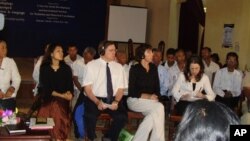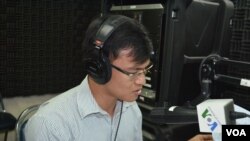WASHINGTON —
Cambodian civic groups depend too much on foreign aid, undermining their independence and the functions of civil society, a Cambodian researcher says.
Sothy Khieng, a doctoral candidate in organizational science and the VU University Amsterdam, told “New Voices” on Monday that their dependence on outside aid means civic organizations don’t have the stability they need.
When donors shift their focus, certain organizations lose their support, weakening their effectiveness, he said.
“Foreign aid creates a dependency syndrome in civil society,” he said. “When donors face financial challenges themselves or when they shift priority to other countries, like in Africa, some organizations have to close down or find alternative approaches to survive.”
Sophal Ear, author of Aid Dependence in Cambodia: How Foreign Assistance Undermines Democracy acknowledged the importance of civil society for Cambodia’s development, but he said for now these organizations are far too weak to keep the government in check.
“Civil society is essentially the only area where you have a chance, basically, to call out the government’s malfeasance,” he said. “And the role of civil society is still limited and weak in Cambodia.”
Based on his own research, Khieng Sothy said the answer is financial self-reliance. Civil society organizations should consider transforming themselves into “semi-profit-making” ventures, while maintaining their original mission and vision.
However, callers to “New Voices” expressed concern, saying such a shift could jeopardize the mission and goals of civil society groups.
Khieng Sothy acknowledged that some problems remain, but he said he has found in his research that business activities can positively impact the operations of civil society. Self-reliance can be a viable approach to sustainability and independence for civil society, he said.
Sothy Khieng, a doctoral candidate in organizational science and the VU University Amsterdam, told “New Voices” on Monday that their dependence on outside aid means civic organizations don’t have the stability they need.
When donors shift their focus, certain organizations lose their support, weakening their effectiveness, he said.
“Foreign aid creates a dependency syndrome in civil society,” he said. “When donors face financial challenges themselves or when they shift priority to other countries, like in Africa, some organizations have to close down or find alternative approaches to survive.”
Sophal Ear, author of Aid Dependence in Cambodia: How Foreign Assistance Undermines Democracy acknowledged the importance of civil society for Cambodia’s development, but he said for now these organizations are far too weak to keep the government in check.
“Civil society is essentially the only area where you have a chance, basically, to call out the government’s malfeasance,” he said. “And the role of civil society is still limited and weak in Cambodia.”
Based on his own research, Khieng Sothy said the answer is financial self-reliance. Civil society organizations should consider transforming themselves into “semi-profit-making” ventures, while maintaining their original mission and vision.
However, callers to “New Voices” expressed concern, saying such a shift could jeopardize the mission and goals of civil society groups.
Khieng Sothy acknowledged that some problems remain, but he said he has found in his research that business activities can positively impact the operations of civil society. Self-reliance can be a viable approach to sustainability and independence for civil society, he said.








